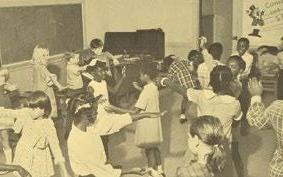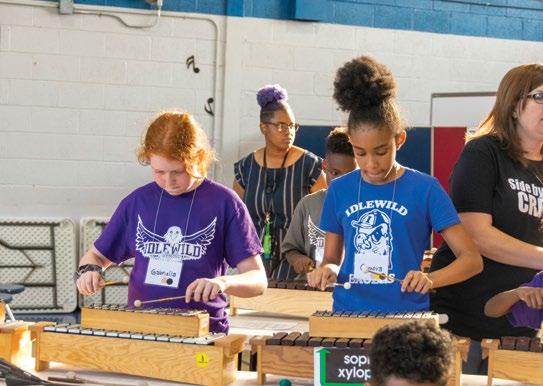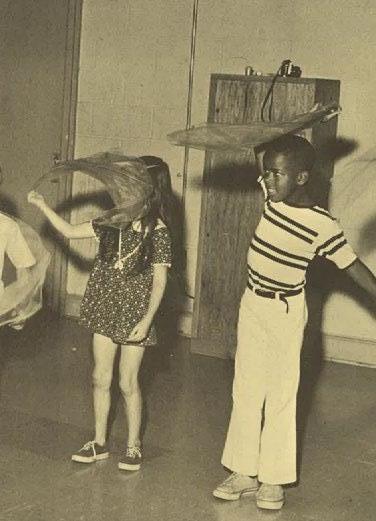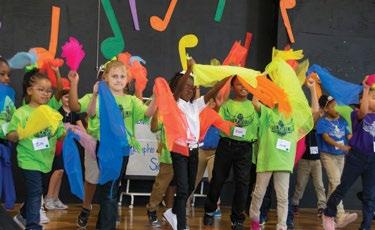
5 minute read
EDUCATION - ORCHESTRA PARTNERSHIP IMPACTING STUDENTS & TEACHERS
NOW & THEN

Advertisement


THEN & NOW
EDUCATION - ORCHESTRA PARTNERSHIP IMPACTING
STUDENTS + TEACHERS
BY BETSY CARTER
Betsy Carter is an Orff Music teacher at Snowden School. She has served as a Shelby County Schools Orff Mentor Teacher for eight years. She is a National Board Certified teacher in Early and Middle Childhood Vocal Music, and recently completed an apprenticeship to become an American Orff Schulwerk Association Teacher Educator. She completed her undergraduate studies at the Eastman School of Music and her Orff certification at the University of Memphis. Betsy has also played trumpet with the Memphis Symphony Orchestra since 1996. In addition to music, she enjoys travel and has road-tripped to 43 states with her family.




THEN & NOW
MSO Orff Side-by-Side Concert at Idlewild School in 2019 Orff Music Students in 1968
On March 10, 2015, the brainchild of the Shelby County Schools (SCS)-Memphis Symphony Orchestra (MSO) Education Committee came to fruition with the first Orff-Orchestra Side by Side concert at Bruce Elementary School. That day, 275 students in grades K-5 performed alongside the full MSO core orchestra, singing, dancing, playing instruments, and performing rhythmic speech, using a combination of repertoire from the Orff Music classroom, folk songs, standard orchestral repertoire, and new works composed and arranged specifically for this venture. Over the course of three months, the program would be performed at five other schools, with each school putting their own stamp on the performance and modifying it to highlight the creativity, ideas, and strengths of its students.
The Orff-Orchestra Partnership is part experience for the students and part professional development for their music teachers as they work together to brainstorm, problem-solve, and create more vibrant lessons for their students. MSO horn player Robert Patterson, who has composed and arranged much of the music involved in this collaboration described the program in 2019 as “like no other educational program with orchestras that I have experienced. The innovation is brilliant for its simplicity. Instead of the orchestra playing for the students, it plays with them.” Now being implemented in 12 schools, the Orff-Orchestra Partnership impacts more than 6000 students per year.
For Patterson, the deep musical connections students feel in this program have inspired the compositions he creates for it. “The music seems to engage them at a much more fundamental level. I often weave quotation from other famous works in to the arrangements that I create,” says Patterson. “The hope is that someday… a subconscious connection to this experience will trigger a deeper love and appreciation for the original works.”
This is far from the first major collaboration between the two organizations. In fact, a partnership between the MSO, Memphis City Schools (now SCS), Memphis State University (now University of Memphis), and the Catholic Diocese of Memphis birthed the SCS Orff program in 1968. The symphony, eager to increase future audiences, approached the (then-MCS) school board about creating an elementary music program in the schools. In response, the school board hired two music teachers, Nancy Ferguson and Konnie Koontz Saliba to write a federal ESEA grant to fund a program. The pair researched various approaches and came upon Orff Music, a child-centered approach to music that encourages students to imitate, explore, and create their own musical ideas.
Ferguson and Saliba submitted their grant application 16 days after the assassination of Martin Luther King, Jr, a context that shaped the way the curriculum and the program itself developed. According to Charlie Tighe, author of We Would Do Well to Listen: A History of Orff Schulwerk in Memphis, TN. “The history of the Memphis Orff Program encompasses an incredible diversity of musical genres coupled with the social, historical, and economic upheaval of the first 70 years of the 20th century.” The district was awarded $350,000 to begin an elementary music program, which was the largest Title III Arts grant that had ever been awarded at that time. An Orff program was started in 6 public elementary schools and 3 private elementary schools. Teachers from these schools formed a “cadre” who shared ideas, gave each other feedback, and developed a curriculum that was relevant to the children in their schools. Summer teacher education courses were developed at Memphis State to train music teachers in this approach to music education. The oldest full Orff curriculum in the country, the Shelby County Schools Orff Music program now reaches nearly 52,000 students in 77 elementary schools.
But what is “Orff Schulwerk”? According to the American Orff Schulwerk Society, the phrase, which translates to ‘Orff school work’ refers to “a teaching model for optimal learning” conceived by German composer Carl Orff and his associate Gunild Keetman , who believed that all children, not only the musically talented, should experience an active and creative music education. The approach utilizes singing, playing instruments, speech, and movement to support “both the conceptual and affective development of children. Active learners develop more thorough and better long-term understanding of the material and ideas involved. Children who regularly improvise and create their own dances and musical settings are uniquely prepared to solve problems in many other contexts.” (aosa.org)
The Orff-Orchestra Partnership has had a great impact on students and teachers alike. Thomas Cesario, teacher at Shelby Oaks Elementary, notes that “My students are now able to accomplish more than I ever expected. I am willing to try things I never thought possible. More importantly, I wait for those special moments where we create magical musical moments in the classroom.” Lane Pellew of Kingsbury Elementary adds, “The unexpected benefit is how close our cohort (of teachers) has become. Each teacher has a different strength, which was evident in the pieces we chose. This forced me out of teaching my comfort zone and made me more well-rounded.”
Like the original joint venture in 1968, the Orff-Orchestra partnership involves faculty and students at the University of Memphis as well. Music Education Professor Dr. Heather Klossner has studied the Orff-Orchestra Partnership and its impact. She has also involved her students through residencies (student teaching) and independent study projects. “In addition to learning how to prepare elementary students for the performance, they see the artistic and collaborative possibilities through such a partnership,” she explains. “This helps these future music educators set the bar high for themselves, their students, and their community.”

ORFF MUSIC STUDENTS IN 1968
MSO ORFF SIDE-BY-SIDE CONCERT AT IDLEWILD SCHOOL IN 2019










